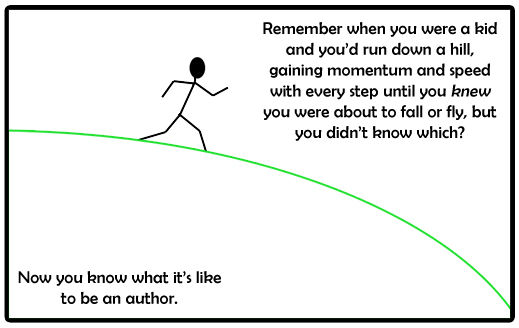I’m about 10,000 words through the third draft of Libriomancer. The scene I wrote yesterday introduces one of Isaac’s colleagues, a fellow magic-wielding librarian. I ended up basing the character on a librarian friend of mine (with permission), one who routinely used to kick my butt at Trivial Pursuit back in grad. school.
I’ve got another character who will be based on the winner of a fundraising auction from earlier this year. That’s two Tuckerizations in one book. (Tuckerization being the practice of inserting real-life people into the book as minor characters.)
I’m also writing a protagonist who’s a SF/F fan, meaning there will be inside jokes aplenty. He quotes Star Wars at one point. He has a toy TARDIS hanging from his rear-view mirror. He makes quips that some readers might not get…
…and that’s where I run into a dilemma. Because with everything I’m doing here, it would be too easy for the book to become self-indulgent. Especially when you add in the fact that I’m bringing Smudge back for this series.
So I’m falling back on the same rule I use when writing humor:
The story comes first.
Years ago, I was reading one of Robert Asprin’s MYTH books, and there was a scene where our hero meets a green-scaled taxi driver. The driver proceeds to talk about this convention where he won the chance to be written into some author’s next book…
Bam. Just like that, I was flung out of the story. I loved the early MYTH books, and I thought it was pretty cool that Asprin had done that, but I was thinking about Robert Asprin instead of the story. It felt like he had paused the story to squeeze in this scene.
With Libriomancer, I could easily work in all sorts of details and backstory about my friend, but she’s not a primary character. It might be fun to work in that puma joke from ’98, but it wouldn’t add to the story.
On the other hand, it would be in character for Isaac, who prides himself on his brains, to mutter something about a Trivial Pursuit rematch when he sees her. It’s not that such things can’t work; they just have to fit the story.
The same holds true for Smudge, and for the inside SF/F jokes. My agent has already suggested I trim the Smudge scenes in chapter one, because while they might be appealing to me and to my goblin fans, they slow down this story. Likewise for Isaac’s Star Wars quotes, or references to other SF/F books and films.
In the end, I believe Tuckerizations, inside jokes, and humor in general should all work the same way:
- It should fit the story.
- It should add to the enjoyment of the story for readers who get it.
- It should not detract from the story for readers who don’t get it.
Easier said than done, especially with the rather meta premise of Libriomancer. It’s a book about SF/F books and magic, and it would be so easy to pack it full of geek references and insider humor … but I don’t want to restrict my readership like that. So in general, if I think something will bump a reader out of the book, it’s getting cut.
What do you think? Any examples of effective or ineffective Tuckerizations or inside jokes? For the writers, what has your experience been with writing (or avoiding) them?







